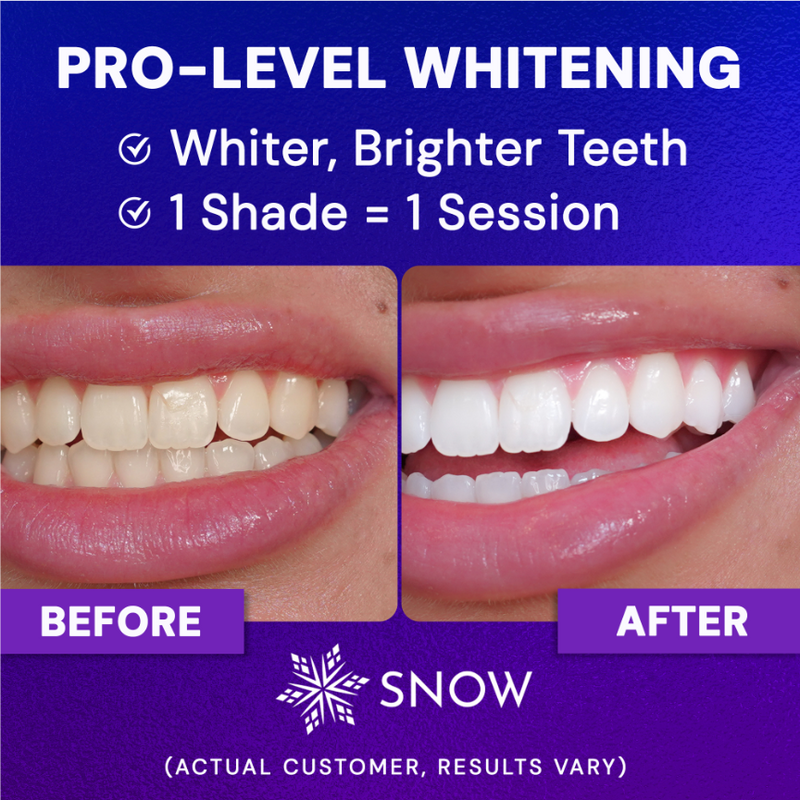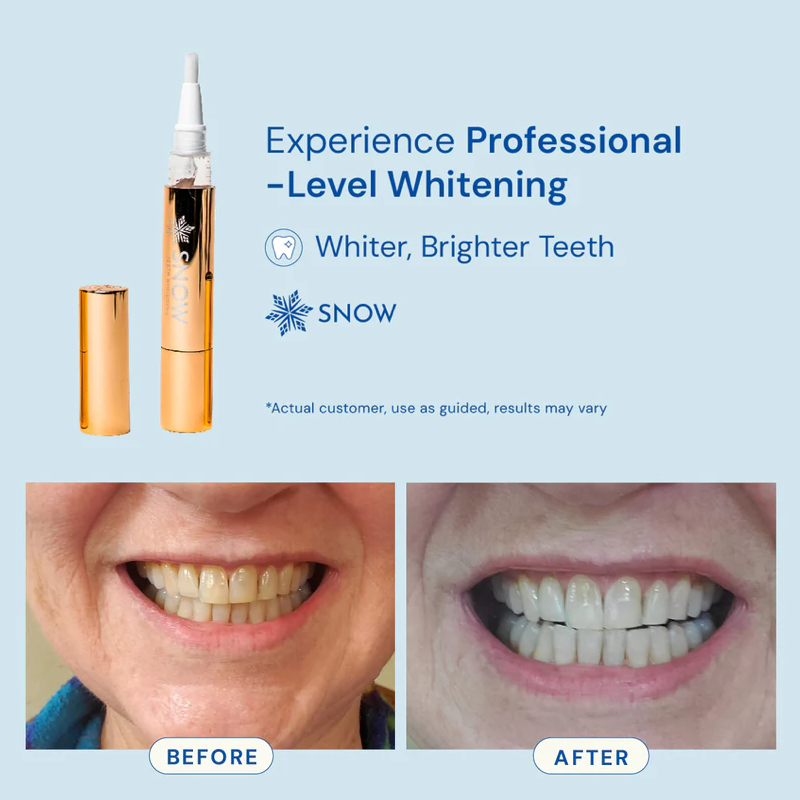
If you have sensitive teeth, read on. We cover everything you need to know about sensitive teeth, ranging from the root cause to when you need to talk to your doctor. Without further ado, let's jump into all things sensitive teeth.
The Root of Tooth Sensitivity

In order to properly treat your tooth sensitivity, you need to know what causes your teeth to become sensitive in the first place. All tooth sensitivity comes from your nerve endings being exposed. This will happen whenever enamel is eroded on the tooth.
Open nerve endings are exposed to certain temperatures or other triggers. Cold foods, wind, and acidic drinks can all irritate the nerve endings. These nerve endings connect to the pulp, which is the main part of your tooth. When it reaches the pulp, that is when you experience the pain.
It's important to find out exactly what triggers your tooth sensitivity. For example, your teeth may only be sensitive to cold food. This will tell you that you should be careful when eating anything that has been chilled or frozen.
Finding the root for your sensitivity won't cure it, but it will help you learn the triggers so you can avoid them at times, making life a bit more manageable.
When It’s More Than Sensitive Teeth
Sometimes, tooth sensitivity can be a sign of something more serious. For example, it can show that you are having issues with your gums. Naturally shrinking gums and gum disease can cause your teeth to feel sensitive.
It's important to treat gum disease right away. If left untreated, it can spread to your bone and jaw, which is highly serious. If the gum disease has not progressed far, you might just need a deep clean, but more serious cases require surgery or medication.
Sensitive teeth can also tell you that you have a cracked tooth or filling. Some cracks can be so bad that they reach the root. Eating cold food will especially be painful whenever your tooth is cracked.
If you suspect that you have a cracked tooth, you need to go to the dentist right away. How they treat the crack depends on how deep it is. New or shallow cracks can be treated with filling. However, the tooth may need to be pulled if the crack goes below the gum line.
Treatments

There are a variety of treatments for avoiding or treating tooth sensitivity. Toothpaste designed for sensitive teeth and fluoride gel are the best options. These treatments help cover the gaps over the nerve endings to prevent pain.
When sensitivity is caused by a cavity or minor tooth decay, a filling will take away that pain. You shouldn't even have to use any additional treatments like toothpaste for sensitive teeth. Anything more than minor tooth decay will require repair and sealant from the dentist. They may even need to remove the damaged tooth and replace it with a fake one.
What You Can Do About Sensitive Teeth Today
If you aren’t able to go to the dentist right away, here are some tips about how to mitigate or treat sensitive teeth:
Avoid Your Triggers
As we already discussed, avoid your triggers when possible. This won't treat the problem, but it will mean you experience less pain throughout your day.
Use a Toothpaste for Sensitive Teeth
The best way to protect your sensitive teeth is to opt for a toothpaste designed for this issue. This type of toothpaste will fill up the nerve ending tubules, helping to block any chances of irritation. You can find a variety of teeth sensitivity toothpaste at your local grocery store or supermarket.
When looking for a toothpaste for sensitive teeth, make sure it contains fluoride and has the ADA seal of acceptance. Simply by selecting a toothpaste with these factors, you may be able to completely remove your tooth sensitivity. If over the counter options are not strong enough, talk to your dentist about getting a prescription toothpaste instead.
Don’t Brush Too Hard
Whenever you use your toothpaste, make sure that you are not brushing too hard. Brushing with a lot of pressure can erode enamel and gum tissue, exacerbating the issue. Additionally, don't use a very hard brush. It will make your teeth more sensitive too.
Instead, use a toothbrush with soft bristles and brush softly. You don't have to scrub your teeth the way you the floor. Be gentle as you're brushing your teeth so as to clean them while not making your condition worse.
Keep Up with Your Oral Routine
In addition to simply brushing your teeth, it is important to keep up with your oral routine. Those with sensitive teeth will especially benefit from a good daily oral care routine. It protects your teeth and prevents the enamel from eroding any further.
Make sure to brush your teeth twice a day, using your soft bristle toothbrush and sensitivity toothpaste. Additionally, floss every night, even when you don't feel like it.
One step that isn't necessary for all people but is helpful for those with tooth sensitivity is rinsing your mouth with a mouthwash. Mouthwashes that are high in fluoride are awesome for tooth sensitivity. If you opt for a mouthwash, make sure that it is free of alcohol.
Choose Oral Products Carefully
When you have sensitive teeth, you need to be careful about what products you choose. Any harsh product can exposure nerve endings even more. Certain whitening products, for example, can make tooth sensitivity worse if you are not careful.
Look for products with fluoride, potassium nitrate, and strontium chloride. These ingredients are great for sensitive teeth. In contrast, do not select a toothpaste with sodium lauryl sulfate, which is responsible for some toothpaste’s foamy texture. This ingredient irritates sensitive teeth a lot.
Try A Mouth Guard
Many people have sensitive teeth because they grind them while they sleep. This is a condition called bruxism, and it puts a lot of pressure on your teeth. This causes your enamel to wear away with time, increasing sensitivity.
Some common signs that you struggle with bruxism is waking up with a sore jaw or headaches. Your teeth may also look filed or smooth. If you think bruxism may be the cause for your sensitivity, try a mouth guard to protect your teeth while you sleep. Talk to your dentist defined a customized mouth guard for your mouth.
Whitening Sensitive Teeth

If you struggle with tooth sensitivity, you likely know how painful it can be to whiten them. That's because most whitening products include ingredients that exacerbate tooth sensitivity. There are some ways that you can still get white teeth without irritating them further.
What to Avoid: Harsh Treatments
Whenever you have sensitive teeth, you need to avoid any harsh whiteners. Although this is a bummer, the whiteners will only make your sensitivity worse. Carbamide peroxide is the ingredient that whitens teeth and leaves them more sensitive.
Of the whitening treatments, whitening strips are one of the worst for people with sensitivity. That's because the strips coat the front of the teeth and are wrapped to the back of them. Since most sensitivity is on the chewing surface, the fact that the whitening strips lay on the surface makes the sensitivity worse.
It is best to avoid whitening treatments with carbamide peroxides, especially whitening strips, if you have tooth sensitivity. These aren't the only things you should avoid, but they are the most notable and most common.
What to Choose Instead
Luckily, whitening is not completely out of the question. You just have to put extra effort in finding the products that don't exacerbate the tooth pain. Certain LED treatments and over the counter options can be the best.
LED treatments are great for whitening sensitive teeth. It targets discoloration, helping your teeth appear whiter. Since you're not supposed to put the gel on the chewing surface of your teeth, this is a safer option for teeth sensitivity. Still, those with severe tooth sensitivity should be cautious even using this product.
You can also find gentle whitening toothpaste that is designed specifically for sensitive teeth. This toothpaste will treat both issues at once. Granted, it takes more time for the whitening effects to be seen, but this toothpaste will not trigger sensitivity in the process.
Whitening pens are another great option for whitening sensitive teeth. These pens allow you to easily whiten just the front of your teeth. Once again, this keeps the gel away from the more sensitive areas, letting you whiten your teeth with little pain.
Foods to Avoid
Even if gentle whitening treatments are too much for your sensitive teeth, the best you can do is to avoid eating or drinking foods that stain. After all, prevention is the best treatment. Just by changing your diet a bit, you can see a big difference in the color of your teeth.
Foods that are high in sugar or acid must be avoided. Acid, which can be found in citrus fruits and other foods, erodes teeth. Similarly, sugar exacerbates tooth decay. As a tooth decays, it is easier for discoloration to show on your teeth.
In addition, avoid any drinks that are high in tannin. This includes coffee, tea, and wine. Tannins are what gives these drinks their color and flavor. They easily stick to teeth and are one of the worst things for discoloration.
The color of the drink doesn't necessarily tell you how much tannin is in the drink. Tea, though lighter in color than coffee, is often worse for staining because it has a higher tannin content.
If you cannot avoid these foods and drinks entirely, just make sure to brush your teeth thoroughly after you eat them. The food will not stain your teeth the second they go into your mouth. They must sit on your teeth surface first. Brush after every snack or meal and you will prevent most discoloration.
Brush and Floss
Even if you are able to cut out most stain-causing foods, don't neglect brushing and flossing every day. Just doing these two simple things will make a huge difference in the color of your teeth. Brush twice a day and floss once.
Do not forget to floss, either. Flossing can make a big difference in the color of your teeth because it removes plaque from between the teeth and gum line. The less plaque there is, the more difficult it is for discoloration to occur. Floss to keep all parts of your teeth clean and shiny.
When to Talk to Your Dentist
The occasional toothache or sensitivity is normal for everyone. If that pain continues for more than two days, talk to your dentist right away. Even a dull pain that persists for multiple days can be a sign of a more serious issue, such as a chipped, cracked, or broken tooth.
Also, talk to your dentist if any other symptoms are seen alongside the tooth sensitivity. In many ways, your teeth are an indicator of other health issues, such as diabetes. Look for issues concerning your gum line and bacteria in your mouth.
When you talk to your dentist, they will inspect your teeth to find out what the issue is. Be as open as possible about your condition so they can best offer recommendations and treatments.
Conclusion
Tooth sensitivity is a real pain in the neck. Try to use toothpaste for sensitive teeth and other treatments to help target the pain. Also, make sure to talk to your dentist for more recommendations and to ensure that the tooth sensitivity is not a sign of something more serious. Chances are, a good toothpaste for sensitivity will be all you need.



































































